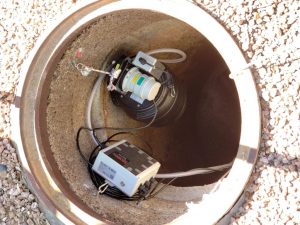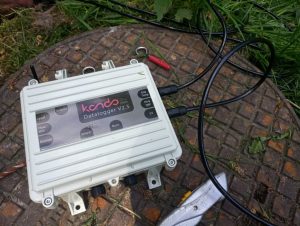From the toilet paper scare to a decline in environmental enforcement, the COVID-19 pandemic is having a major impact on wastewater treatment plants and sewage systems the world over.
Wet wipes, newspapers, gloves, paper towels, and other non-flushable items are clogging sewage systems, creating backups, setting off overflows and polluting our cities, oceans, and foods.
Municipalities in northern Italy, across the US, in Australia, and in parts of Europe are looking to an Israeli smart wastewater management solutions provider for help.
Kando, headquartered in the little-known town of Tzur Igal, 37 kilometers north of Tel Aviv, is using IoT, original algorithms, and artificial intelligence technologies to enable wastewater utilities to detect pollution anomalies and blockages in real time in order to keep the world’s sewage systems hygienic and working.

“There are a lot of sewage and wastewater systems that are failing in this crisis,” Ari Goldfarb, CEO of Kando, tells NoCamels. “When there is a failure in the sewage system, bacteria and viruses in the wastewater overflow into our streets, into our cities, into our food, and into our rivers.”
Goldfarb says five municipalities in northern Italy have become new clients in the past few weeks. “Our biggest market right now is in northern Italy. Based on their experience, they have told us that they need much more remote support right now for their sewage systems to continue working,” says Goldfarb.
“To innovate the monitoring and control systems to protect the citizens we serve is certainly one of the priorities that we have set for ourselves as a company in recent years,” Paolo Saurgnani, director of Acque Bresciane Srl water utility company in Italy, told Palazzolo sull’Oglio journal when explaining why they turned to Kando for help. “The growing presence of contaminants in urban and non-urban wastewater represents an increasingly evident pollution trend. This is an element of risk for the water system, as a whole, if it is not thought of in terms of resilience—that is, the ability to cope with changes, even unexpected ones, guaranteeing a real and perceived continuity of service.”
“Kando’s solution allows cities to control—continuously and remotely—their wastewater quality and protect public health, which these days, more than ever, is a top priority,” says Gili Elkin, board member and chief growth officer at Kando.
She adds that “it is only a matter of time before Kando’s system becomes an industry standard.”
Goldfarb relates that the new clients in northern Italy were “in shock” that their systems clogged, are polluted, and are overflowing. “You have to manage it and control it,” says Goldfarb. “In Israel, we reuse more than 80% of wastewater. In Israel, we see wastewater as a product.”
Indeed, in Israel, treated wastewater, or effluent, is considered as a resource, and the recycled, cleaner wastewater is used for agricultural irrigation and industry. There is specific legislation for wastewater collection and treatment systems, as well as permits for treated wastewater users.
And it’s not just flushing problems that are fueling the wastewater crisis. Goldfarb says now that there are fewer regulators ensuring environmental compliance, factories are sidestepping green rules too.
With over two decades of expertise in the wastewater sector, Goldfarb is an active campaigner for the need to embed new technologies in water treatment solutions.
He founded his company on the idea that with IoT, it was possible to offer real-time pollution alerts and network health updates.
When Goldfarb established his company eight years ago, his idea to use technology to not only avoid pollution but also better manage wastewater was trailblazing. His first local clients agreed to partner with the company even though they had no successful cases to show for.
“This is unique to Israel. Clients partnered with us and helped us develop the technologies. We started with an idea and the clients took a chance with us,” says Goldfarb.
Kando’s end-to-end solution, Clear Upstream, provides real-time awareness of events in wastewater networks. Using live maps, online dashboards, and text messages, the company looks at the collected data and identifies the problems, events’ sources, and tells its clients where to act.
“We are changing the way wastewater thinks,” says Goldfarb of his company’s proprietary technologies.
The company’s sensors collect wastewater data from a sewage network, and then a cloud-based analytics engine transforms the data into actionable insights.
“Our technologies can identify the source of a blockage and can warn ahead of time where the blockage will occur. That creates more control in the system. It is a matter of time for the sewer system to fail, for us to get the plague and other bacteria in our foods and water. That’s why we invest so much in the remote control of the systems, so it won’t happen,” says Goldfarb.
The company is also changing how people think about wastewater. “We love Kando’s technology because it goes beyond identifying the symptoms of a problem—in this case, water pollution—and identifies exactly where the source of the problem is,” Dawn Lippert, CEO of Elemental Excelerator, tells Forbes. “Most importantly, Kando finds these problems in real time, which allows communities who are impacted by industrial or agricultural pollution to take action.”
Goldfarb says being from Israel, “a global leader in water and technology,” continues to open doors—and sewage systems—for the company.
Indeed, there is a long list of blue- and white-water tech companies and researchers transforming the world’s water conservation sector. Among them, IDE Technologies is world-renowned for manipulating and reusing municipal wastewater; Aqwise is a leading provider for implementing wastewater treatment solutions; and Ayala Aqua uses plants to clean wastewater. In 2017, researchers from the US, Germany, and Israel teamed up to develop a filtration membrane that removes viruses and bacteria from wastewater.
The United Nations says improving the way we manage wastewater is one of the world’s most urgent challenges. A 2017 UNESCO report shows that over “80% of wastewater is released to the environment without adequate treatment,” while “opportunities from exploiting wastewater as a resource are enormous. Safely managed wastewater is an affordable and sustainable source of water, energy, nutrients, and other recoverable materials.”

To fully manipulate wastewater, new technologies are needed. And Kando’s Goldfarb says the COVID-19 pandemic has at least one silver lining—utility networks will better understand the need to integrate technologies into water management.
“Decisions are being made faster. The water market understands it must implement technologies to make it work,” says Goldfarb. “After this virus crisis, I think the maturity of this market, in terms of its acceptance of technologies, will be faster. Once you accept the need for technology, there’s no way back.”
This article first appeared in NoCamels, which covers innovations from Israel for a global audience.


